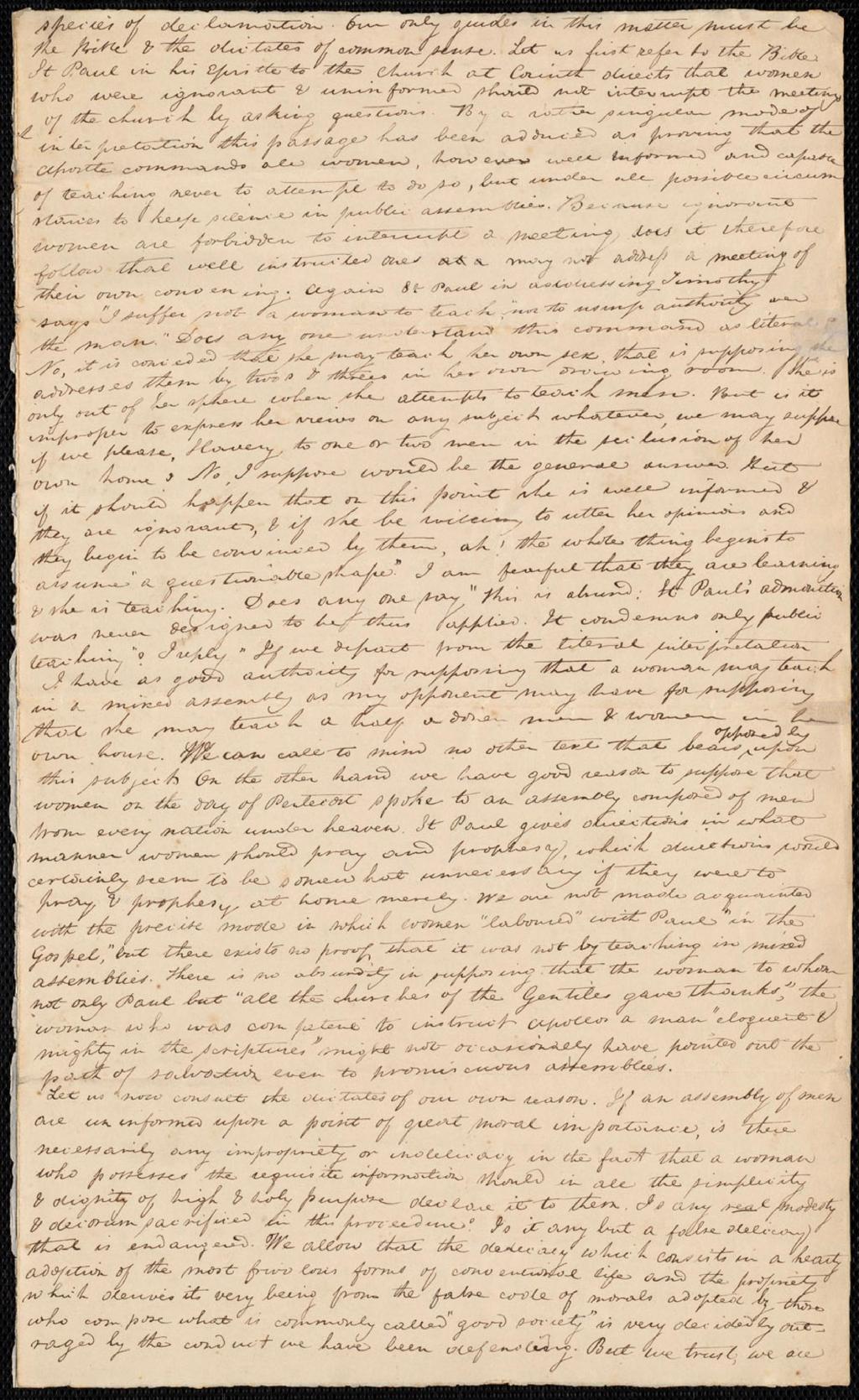species of declamation. Our only guides in this matter must be the Bible & the dictates of common sense. Let us first refer to the Bible. St Paul in his Epistle to the Church at Corinth directs that women who were ignorant & uninformed should not interrupt the meeting of the church by asking questions. By a rather singular modern interpretation this passage has been adduced as proving that the Apostle commands all women, how ever well informed and capable of teaching never to attempt to do so, but under all possible circumstances to keep silent in public assemblies. Because ignorant women are forbidden to interrupt a meeting does it therefore follow that well instructed ones may not address a meeting of their own convening. Again St Paul in addressing Timothy says "I suffer not a woman to teach," not to usurp authority over the man." Does any one understand this command as literal. No it is conceded that she may teach her own sex, that is supposing she addresses them by twos & threes in her own drawing room. She is only out of her sphere when she attempts to teach men. But is it improper to express her views on any subject whatever, we may suppose if we please, Slavery to one or two men in the seclusion of her own home! No, I suppose would be the general answer. But if it should happen that on this point she is well informed & they are ignorant, & if she be willing to utter her opinions and they begin to be convinced by them, ah! the whole thing begins to assume "a questionable shape." I am fearful that they are learning & she is teaching. Does any one say "this is absurd; St Paul's adm(?)tion was never designed to be thus applied. It condemns only public teaching "! I reply" If we depart from the literal interpretation I have as good authority for supposing that a woman may teach in a mixed assembly as my opponent may have for supposing that she may teach a half a dozen men & women in her own house. We can call to mind no other text that bears(?) (opposed by) upon this subject. On the other hand we have good reason to suppose that women on the day of Pentecost spoke to an assembly composed of men from every every nation under heaven. St Paul gives directions in what manner women should pray and prophesy, which directions would certainly seem to be somewhat unnecessary if they were to pray & prophesy at home merely. We are not made acquainted with the precise mode in which women "laboured" with Paul "in the Gospel," but there exists no proof that it was not by teaching in mixed assemblies. There is no absurdity in supposing that the women to whom not only Paul but "all the churches of the Gentiles gave thanks," the woman who was competent to instruct Apollos a man "eloquent & mighty in the scriptures" might not occasionally have pointed out the fact of salvation even to promiscuous assemblies.
Let us now consult the dictates of our own reason. If an assembly of men are uninformed upon a point of great moral importance, is there necessarily any impropriety or indelicacy in the fact that a woman who possesses the requisite information should in all the simplicity & dignity of high & holy purpose declare it to them. Is any real modesty & decorum sacrificed in this procedure? Is it any but a false delicacy that is endangered. We allow that the delicacy which consists in a hearty adoption of the most frivolous forms of conventional life and the propriety which derives its very being from the false code of morals adopted by those who compose what is commonly called "good society" is very decidedly outraged by the conduct we have been defending. But we trust, we are
